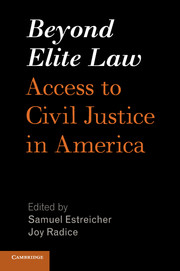Book contents
- Frontmatter
- Contents
- Beyond Elite Law
- Foreword
- List of Contributors
- Overview
- Overview
- PART I CURRENT STATE OF ACCESS TO LEGAL SERVICES
- PART II SOURCES OF LEGAL SERVICES ASSISTANCE FOR WORKING AMERICANS
- PART III FASHIONING A REFORM AGENDA
- 23 New York State Task Force to Expand Access to Civil Legal Services
- 24 New York's 50-hour Pro Bono Requirement
- 25 Starting a “Low Bono” Law Practice
- 26 Toward a More Effective and Accessible Solo and Small Firm Practice Model
- 27 Facilitating Homemade Wills
- 28 Court Facilitation of Self-Representation
- 29 Limited Representation and Ethical Challenges
- 30 Technology Can Solve Much of America's Access to Justice Problem, If We Let It
- 31 Mediation of Employment Disputes at the EEOC
- 32 AAA Consumer Arbitration
- 33 Saturns for Rickshaws: Lessons for Consumer Arbitration and Access to Justice
- 34 Employment Arbitration in the Securities Industry
- 35 FINRA Arbitration and Employment Disputes
- 36 Arbitration as an Employee-Friendly Forum
- 37 Access to Justice in Employment Arbitration: a Critical Look
- 38 Collaborative Technology Improves Access to Justice
- 39 Union Representation in Employment Arbitration
- 40 Legal Representation for New York City's Chinese Immigrant Workers
- 41 Reassessing Unauthorized Practice of Law Rules
- 42 The Pyett Protocol: Collectively-Bargained Grievance Arbitration as a Forum for Individual Statutory Employment Claims
- PART IV CREATING A CULTURE OF SERVICE
- Index
23 - New York State Task Force to Expand Access to Civil Legal Services
from PART III - FASHIONING A REFORM AGENDA
Published online by Cambridge University Press: 05 May 2016
- Frontmatter
- Contents
- Beyond Elite Law
- Foreword
- List of Contributors
- Overview
- Overview
- PART I CURRENT STATE OF ACCESS TO LEGAL SERVICES
- PART II SOURCES OF LEGAL SERVICES ASSISTANCE FOR WORKING AMERICANS
- PART III FASHIONING A REFORM AGENDA
- 23 New York State Task Force to Expand Access to Civil Legal Services
- 24 New York's 50-hour Pro Bono Requirement
- 25 Starting a “Low Bono” Law Practice
- 26 Toward a More Effective and Accessible Solo and Small Firm Practice Model
- 27 Facilitating Homemade Wills
- 28 Court Facilitation of Self-Representation
- 29 Limited Representation and Ethical Challenges
- 30 Technology Can Solve Much of America's Access to Justice Problem, If We Let It
- 31 Mediation of Employment Disputes at the EEOC
- 32 AAA Consumer Arbitration
- 33 Saturns for Rickshaws: Lessons for Consumer Arbitration and Access to Justice
- 34 Employment Arbitration in the Securities Industry
- 35 FINRA Arbitration and Employment Disputes
- 36 Arbitration as an Employee-Friendly Forum
- 37 Access to Justice in Employment Arbitration: a Critical Look
- 38 Collaborative Technology Improves Access to Justice
- 39 Union Representation in Employment Arbitration
- 40 Legal Representation for New York City's Chinese Immigrant Workers
- 41 Reassessing Unauthorized Practice of Law Rules
- 42 The Pyett Protocol: Collectively-Bargained Grievance Arbitration as a Forum for Individual Statutory Employment Claims
- PART IV CREATING A CULTURE OF SERVICE
- Index
Summary
Over the past decade, state courts have been at the forefront of seeking to increase access to legal assistance and facilitating self-representation in civil cases. In this chapter, Helaine Barnett, former president of the Legal Services Corporation, describes her work on the Task Force to Expand Access to Civil Legal Services in New York, which was set in motion by former New York State Chief Judge Jonathan Lippman. The statewide task force first set out to assess the needs of New Yorkers who did not have legal assistance and then framed solutions around those findings.
“Equal Justice under Law” is a founding principle of our nation dating back to the Preamble of the Constitution and a concept that is familiar to most Americans. We all believe that rich or poor, we should be treated equally in our courts. Although equal access to justice remains an ideal, the reality is very different for those unable to afford the assistance of counsel in civil cases. Unlike in criminal cases, there is no constitutionally established right to counsel in civil cases for those who cannot afford it, even in cases involving essential issues such as housing, healthcare, child custody, or protection from domestic violence. For people of limited means, the result is that in the vast majority of civil cases where crucial issues are at stake, they have to navigate a complex legal system alone.
There is a system of civil legal services available to those who cannot afford counsel that addresses a small percentage of the need, supported by funding from a variety of sources. The biggest source of funding is the Legal Services Corporation (LSC), a private, nonprofit corporation created by Congress in 1974 that distributes funding from annual federal appropriations to 134 independent legal services providers throughout the country, in every state and territory of the United States. Current LSC funding is at about $375 million annually, to serve an eligible population of over 63 million Americans, the number of people who meet the qualifying criteria of earning no more than 125% of the federal poverty level. LSC funding supports programs to assist the 1 in 5 Americans at that income level or below, which is currently $30,313 for a family of four.
- Type
- Chapter
- Information
- Beyond Elite LawAccess to Civil Justice in America, pp. 343 - 358Publisher: Cambridge University PressPrint publication year: 2016



